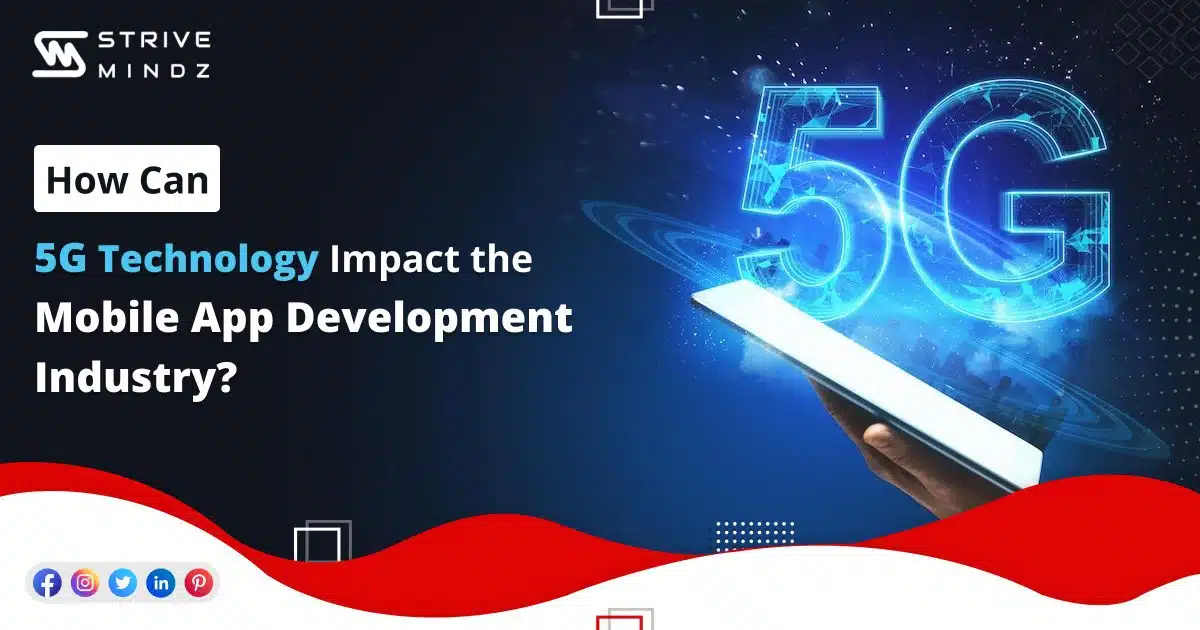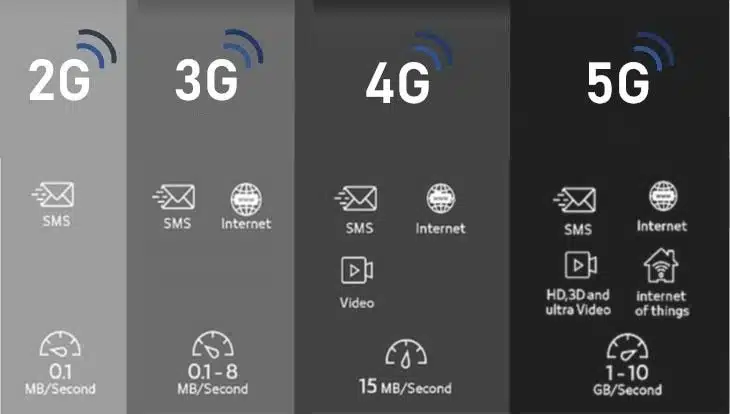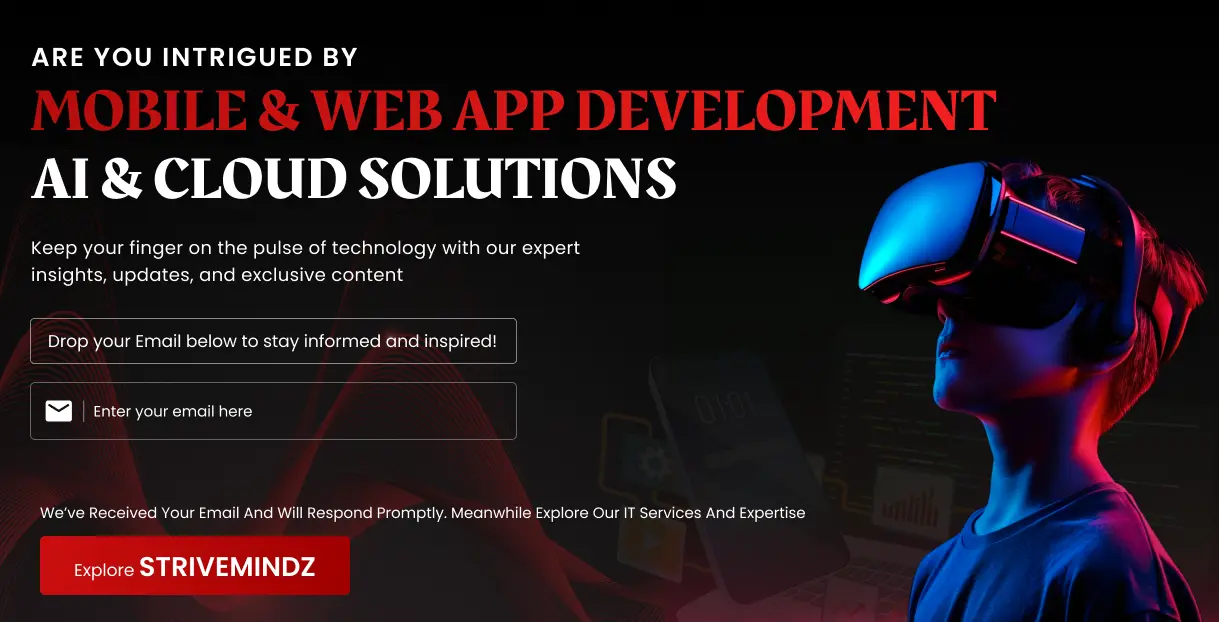How Can 5G Technology Impact the Mobile App Development Industry?

Can you imagine transferring billions of gigabytes of data to an endless number of devices worldwide within a blink of an eye? In fact, 5G technology, or fifth-generation wireless cellular networks, has made it possible because we have entered the age of the technological revolution.
Finally, 5G has launched in the market after much debate. This is one of the most robust trends in mobile app development, bringing change to some industries. A wide range of people can share in the excitement, such as consumers, developers, and tech enthusiasts.
Understanding 5G Technology
5G technology, in simple terms, refers to the fifth generation of wireless communication technology. It represents a significant advancement over its predecessors, such as 4G and 3G. 5G technology is designed to deliver faster speeds, lower latency, increased network capacity, and improved connectivity compared to previous generations.
With 5G, data transmission speeds can reach unprecedented levels, enabling quicker downloads, seamless video streaming, and real-time interactions. This technology operates on higher frequency bands, which allows for greater bandwidth and faster data transfer rates. As a result, users can experience smoother and more responsive connectivity, enhancing their overall digital experience.
Moreover, 5G technology offers lower latency, meaning there is less delay in transmitting data between devices and networks. As a result of the reduced latency, applications such as online gaming, video conferencing, and autonomous vehicles can communicate in real-time.
The Evolution of Cellular Technology
- First Generation (1G): The first generation of cellular technology, introduced in the 1980s, was based on analog signals. 1G networks offered basic voice calling capabilities with limited coverage and low-quality sound. These networks used bulky and inefficient mobile phones, and data services were virtually non-existent.
- Second Generation (2G): The advent of 2G cellular technology marked a major leap forward. Introduced in the 1990s, 2G networks brought digital communication, enabling improved voice quality, encryption for secure calls, and basic data services like text messaging (SMS). The introduction of Global System for Mobile Communications (GSM) and Code Division Multiple Access (CDMA) standards laid the foundation for the widespread adoption of mobile phones.
- Third Generation (3G): The introduction of 3G technology in the early 2000s revolutionized mobile communications. 3G networks offered faster data transfer speeds, enabling multimedia services such as video calling, mobile internet browsing, and multimedia messaging (MMS). These networks also supported higher-quality voice calls. With 3G, mobile phones evolved into more compact and feature-rich devices.
- Fourth Generation (4G): 4G technology, introduced in the late 2000s, brought significant advancements in speed, capacity, and reliability. 4G networks offered faster data transfer rates, enabling high-quality video streaming, online gaming, and advanced mobile applications. This technology facilitated the rise of smartphones, ushering in an era of app-driven ecosystems and mobile internet dominance. 4G networks also supported voice calls over internet protocols (VoIP).
- Fifth Generation (5G): The ongoing deployment of 5G technology represents the next major leap in cellular technology. 5G networks promise exceptional speed, ultra-low latency, massive device connectivity, and the ability to handle vast amounts of data. With 5G, users can experience lightning-fast downloads, real-time streaming, and seamless connectivity in densely populated areas. This technology opens up possibilities for emerging technologies like augmented reality (AR), virtual reality (VR), and the Internet of Things (IoT).
The evolution of cellular technology has not only transformed our communication capabilities but has also paved the way for digital innovation across industries. Each generation has brought improved performance, increased connectivity, and more advanced features. As 5G continues to roll out globally, it is expected to drive further advancements, unlocking new opportunities and transforming the way we live, work, and interact with technology.
How will the 5G Technology Growth Market develop in 2023?
The global 5G services market size was estimated at USD 60.61 billion in 2022 and is expected to grow by 59.4% from 2023 to 2030. Providing consumers with a wide range of use cases and business models, 5G wireless mobile services enable a fully mobile and connected environment. Moreover, faster data speeds and extremely low latency would enhance the user experience when using 5G services for several use cases, including Virtual Reality (VR) and Augmented Reality (AR) gaming, seamless video calling, and Ultra-High Definition (UHD) videos. It is estimated that over the forecast period, the demand for high-speed data connectivity will boost the adoption of unified Internet of Things (IoT) applications, such as smart home energy management.
Impact of 5G Technology on Mobile App Development
-
Enhanced Connectivity and Speed
5G technology provides lightning-fast connectivity, which is one of its primary advantages. With significantly higher download and upload speeds, mobile apps can deliver content and data to users in real-time. This improved speed enables seamless video streaming, immersive gaming experiences, and faster data transfers, resulting in enhanced user satisfaction.
-
Improved User Experience
With lower latency and higher bandwidth, 5G enables mobile apps to offer a more immersive and responsive user experience. Users can enjoy lag-free video calls, uninterrupted streaming, and smooth app performance even in crowded network environments. This improved user experience can lead to higher engagement, increased user retention, and better app store ratings.
-
Integration of Advanced Technologies
5G technology opens up avenues for integrating advanced technologies into mobile app development. As an example, 5G networks offer increased bandwidth and low latency, making it possible to integrate augmented reality (AR) and virtual reality (VR) experiences seamlessly.
The technology allows developers to create immersive, interactive applications for gaming, education, marketing, and more.
-
IoT and Smart Devices
There is a rapid expansion of the Internet of Things (IoT) industry, with a wide range of smart devices becoming available. 5G’s low latency and high capacity can support the massive data exchange required for seamless connectivity among these devices. Mobile app developers can leverage 5G to build apps that control and monitor smart devices, enabling home automation, smart healthcare solutions, and efficient industrial processes.
-
Edge Computing and Cloud Services
5G technology facilitates the integration of edge computing and cloud services into mobile app development. Edge computing allows for data processing and storage closer to the user, reducing latency and enabling real-time analytics. Combined with cloud services, mobile app developers can build powerful and scalable apps that utilize the full potential of edge computing, benefiting from enhanced performance and efficient resource utilization. Apologies for any inconsistency. Here’s the continuation of the article in English (UK) language:
-
Security and Privacy
With the increased reliance on mobile apps for various activities, security and privacy become paramount. 5G technology offers enhanced security features, including stronger encryption protocols and more robust authentication methods. This ensures that user data remains secure while using mobile apps. Additionally, 5G networks provide better protection against cyber threats, safeguarding both users and app developers.
-
Augmented Reality (AR) and Virtual Reality (VR)
A new wave of mobile app development possibilities is emerging with 5G, augmented reality (AR) and virtual reality (VR). AR and VR applications require high-speed connectivity and low latency to deliver immersive and seamless experiences. With 5G, mobile apps can provide users with interactive virtual environments, whether it’s for gaming, training simulations, or virtual tours, enhancing engagement and unlocking new business opportunities.
-
Artificial Intelligence (AI) and Machine Learning (ML)
5G technology complements the capabilities of artificial intelligence (AI) and machine learning (ML) in mobile app development. With faster data transmission and lower latency, AI and ML algorithms can process and analyze vast amounts of data in real time.
This enables mobile apps to offer personalized recommendations, predictive functionalities, and intelligent automation. 5G-powered AI and ML integration empowers app developers to create smarter, more efficient applications.
-
Enhanced App Development Capabilities
Mobile app development becomes more efficient and streamlined with 5G technology. Developers can leverage the higher bandwidth and lower latency of 5G networks to accelerate the development process, perform remote debugging, and test apps in real time. Additionally, 5G enables developers to leverage cloud-based tools and services for collaborative app development, making it easier to work on projects across geographically dispersed teams.
-
Collaboration and Communication
5G facilitates seamless collaboration and communication between developers, businesses, and users. With faster and more reliable connectivity, developers can collaborate in real-time, share resources, and conduct virtual meetings. Furthermore, businesses can leverage 5G-powered apps for improved customer communication and engagement, enabling instant feedback, personalized interactions, and efficient customer support.
-
Monetization Opportunities
The introduction of 5G technology brings forth new monetization opportunities for mobile app developers. With faster data speeds and enhanced user experiences, developers can offer premium features, in-app purchases, and subscription-based models to generate revenue. Moreover, 5G-enabled apps can tap into emerging markets such as augmented reality advertising and location-based services, providing additional avenues for monetization.
Wrapping up
The integration of 5G technology into the mobile app development industry heralds a new era of possibilities and innovation. With enhanced connectivity, improved user experiences, and the integration of advanced technologies, 5G empowers developers to create more immersive, secure, and intelligent applications.
As 5G networks continue to expand worldwide, the mobile app development industry is poised for significant growth and transformation.



